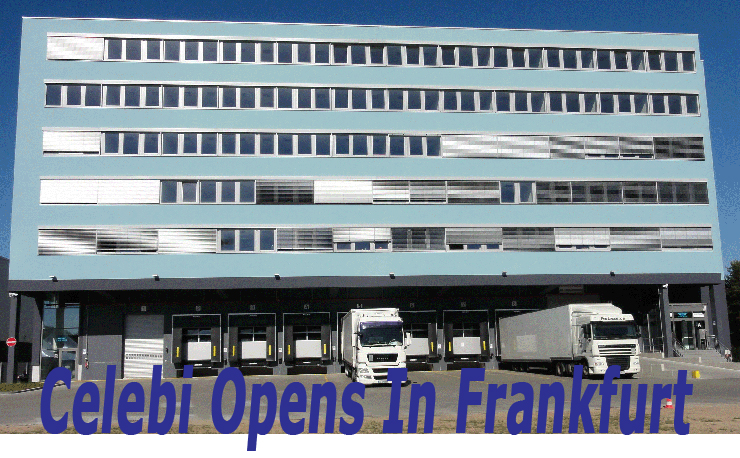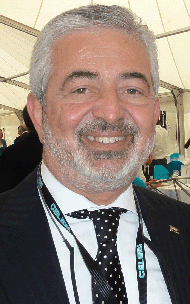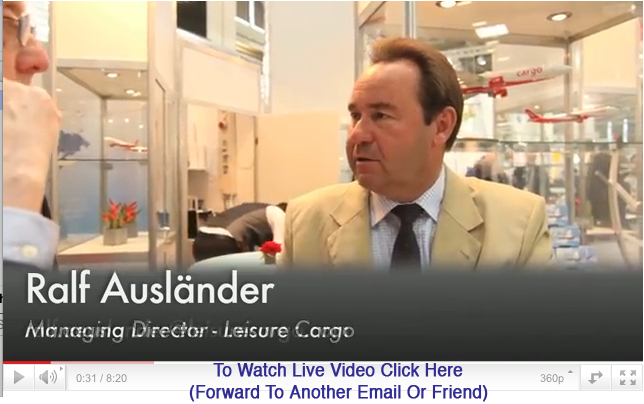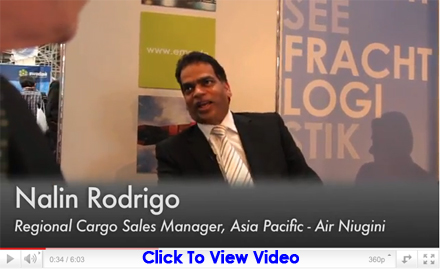 Short
speeches, tasty food, swinging music and lots of bilateral talks: Celebi’s
recent inauguration party, attended by more than 200 invitees at Frankfurt’s
Cargo City, was a memorable event. The cause for celebration was the
official opening of the Turkish cargo handling agent’s first warehouse
in Germany. Short
speeches, tasty food, swinging music and lots of bilateral talks: Celebi’s
recent inauguration party, attended by more than 200 invitees at Frankfurt’s
Cargo City, was a memorable event. The cause for celebration was the
official opening of the Turkish cargo handling agent’s first warehouse
in Germany.
Celebi has rented a 15,000-square meter
warehouse plus additional 8, 800 sqm office space at Rhein-Main airport.
 “This
facility suffices to manage an annual throughput of up to 240,000 tons
without problems,” explains Samim Aydin, (left) Celebi’s
President Ground Services, Europe. His enterprise invested 4.5 million
euros to equip the building with the latest technology, in order to
enable the utmost automation of processes. “This
facility suffices to manage an annual throughput of up to 240,000 tons
without problems,” explains Samim Aydin, (left) Celebi’s
President Ground Services, Europe. His enterprise invested 4.5 million
euros to equip the building with the latest technology, in order to
enable the utmost automation of processes.
“The expenditure will pay off,
because we can offer our customers a best practice quality.” Every
single item leaving the facility has been x-rayed prior to being loaded
on board of an aircraft, Celebi’s manager assures. In addition,
a number of boxes and packages are hand controlled by the warehouse
staff “whenever we believe this to be necessary for one reason
or another,” Aydin outlines his firm’s uncompromising security
philosophy.
Currently, Celebi’s largest client
is U.S. carrier United Airlines. “The data confirm a 98.8 average
handling performance here at our Frankfurt facility for all U.S. bound
shipments flown on transatlantic routes by our partner,” says
the manager after consulting his files.
They date back to last December, when
Celebi started operations offering handling activities at Rhein-Main,
but waited until now to present the results to its biz partners and
the media. “Our aim is not to challenge the big boys here in Frankfurt,
but to gain as much as ten percent of the air freight handling market
at this spot,” says the agent’s President Global Cargo Cemil
Erman, of his enterprises’ strategy.
In addition to United, which offers as
many as seven daily passenger flights to Frankfurt, his colleague Aydin
names Continental Cargo and Balkan-based regional carrier Moldova as
clients. “We are in advanced talks with a number of European and
Asian airlines,” he adds. One of the big global cargo airlines
seems to be absent from his list of potential clients. “We don’t
want to be dependent on one major capacity provider because if he decided
to change his handling agent or if he should scratch Frankfurt from
its route map we would run into a huge problem.” Instead, the
Istanbul-headquartered service provider targets a healthy mix of different
airlines.
According to the Celebi managers, Frankfurt
is considered to be a door opener to the German and European market.
Next to come, announces Cemil Erman, are stations in Cologne and Düsseldorf.
Further, his enterprise is eyeing the UK and Russia to offer handling
services at some of the cargo hubs there.
Until recently the enterprise, founded
in 1958 by Ali Cavit Celebioglu, concentrated its air freight activities
at the Turkish airports. Meanwhile an international expansion is under
way, documented by cargo handling subsidiaries in Mumbai (Bombay), Delhi,
Budapest, and now Frankfurt. In addition to ground handling the privately
owned enterprise offers a variety of different services, including activities
in the fields of maritime, security, tourism, transport, and catering.
Heiner Siegmund/Flossie
|





![]() 100%
Green
100%
Green